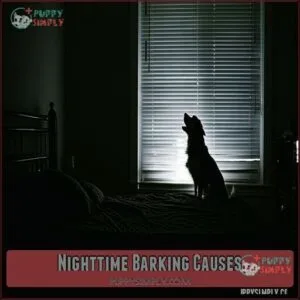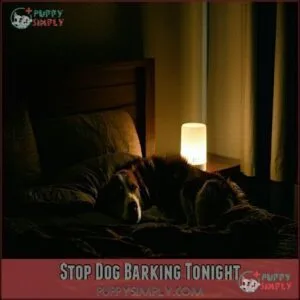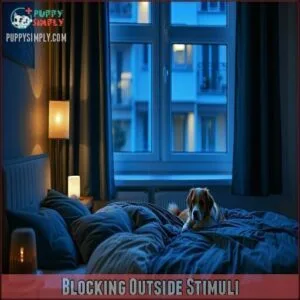This site is supported by our readers. We may earn a commission, at no cost to you, if you purchase through links.
 To stop your dog barking at night, start by figuring out why they’re barking. Are they bored, anxious, or hearing something outside?
To stop your dog barking at night, start by figuring out why they’re barking. Are they bored, anxious, or hearing something outside?
Address the cause directly. Keep them tired with play and exercise during the day, and set a calming bedtime routine, like a quiet space with their favorite blanket.
Block outside noise with white noise or curtains. Teach a “quiet” command using treats for positive reinforcement.
If they’re still uneasy, try calming aids like pheromone diffusers or vet-approved supplements. Remember, consistent routines are key. Want your nights back? A few adjustments can make everyone, including your dog, sleep soundly.
Table Of Contents
- Key Takeaways
- Nighttime Barking Causes
- Stop Dog Barking Tonight
- Training for Quiet Nights
- Environmental Modifications
- Consistent Daily Routines
- Calming Strategies Work
- Effective Barking Solutions
- Frequently Asked Questions (FAQs)
- How do you stop a dog barking at night?
- How to stop excessive barking in dogs?
- Why does my dog bark at night?
- Should you let a dog out of a crate if he barks?
- What can I do about dogs barking all night?
- What does it mean when a dog barks at night?
- How do you discipline a dog to stop barking?
- How do I get my dog to stop barking at night?
- Is it best to ignore a barking dog at night?
- Why do dogs bark continuously at night?
- Conclusion
Key Takeaways
- Create a calm bedtime routine with a cozy sleeping spot and white noise to block outside triggers.
- Exercise your dog regularly during the day to curb boredom and keep them tired at night.
- Teach a "quiet command" using positive reinforcement, rewarding silence and ignoring attention-seeking barks.
- Identify the root cause, like anxiety or discomfort, and address it with calming aids or environmental changes.
Nighttime Barking Causes
Your dog’s nighttime barking is often triggered by specific causes including boredom, anxiety, territorial responses, or even physical discomfort.
Understanding why your dog barks at night is the essential first step to finding an effective solution that addresses the root of the problem.
Nighttime barking often highlights your dog’s needs or anxieties—address the root cause for a peaceful, restful night for both of you.
Boredom and Attention-Seeking
Ever wonder why your dog barks incessantly at night?
Often, it’s simply boredom or attention-seeking behavior. Dogs who don’t receive enough daytime stimulation may vocalize to relieve frustration.
Your pup may have learned that barking gets your attention—even negative reactions count!
Combat this by increasing exercise and enrichment during the day.
Try interactive games and puzzle toys, then practice consistent ignoring at night while rewarding quietness.
Fear and Anxiety Triggers
Three key fear and anxiety triggers often cause your dog’s nighttime barking.
Separation distress emerges when you’re in another room, while noise aversion makes your pup react to thunder or fireworks.
Environmental changes like new furniture or house guests can trigger anxious dog barking.
Past trauma may resurface in darkness, and some breeds are naturally more prone to dog anxiety, especially at night, due to separation distress.
Territorial Instincts and Medical Issues
Your dog’s territorial instincts often trigger nighttime barking when they detect intruders or wildlife.
Don’t ignore persistent barking, as medical issues like arthritis pain or senior disorientation could be the cause.
Some breeds have a predisposition to bark more.
If your dog suddenly starts barking at night, consult your vet to rule out underlying medical conditions that require pain management for issues like senior disorientation.
Stop Dog Barking Tonight
If your sleep is constantly interrupted by night time barking, you need immediate interventions that work tonight. You don’t have to wait weeks for training results—some tactics can provide instant relief from your dog’s persistent woofing.
For quick solutions that offer urgent action against dog barking at night:
- Create a sound barrier by turning on a white noise machine or soft music near your dog’s sleeping area to mask external triggers.
- Temporarily move your dog’s bed closer to yours for tonight’s success—dogs often feel more secure when near their humans.
- Cover windows with blackout curtains to block visual stimuli like passing cars or wildlife that might trigger barking episodes.
These dog barking solutions aren’t permanent fixes, but they’ll help you both get through tonight while you work on longer-term training strategies. Consider using engaging puzzle toys to provide mental stimulation and reduce boredom-induced barking. With these tactics, you’ll experience quiet dog at night sooner than you think, and achieve a more restful sleep.
Training for Quiet Nights
You’ll need to consistently train your dog with commands like "quiet" while rewarding calm behavior to create lasting change.
Establishing a proper training routine helps break the cycle of attention-seeking barks and teaches your pet that silence brings more rewards than noise, which is a key concept in understanding that calm behavior is essential.
Teaching Quiet Command
Teaching your dog the "quiet" command starts with catching them in the act of barking.
First, say "quiet" in a calm, firm voice while holding a treat. When your dog stops barking, even briefly, reward them immediately.
Consistency training is key—practice daily using the same verbal cues and hand signals.
Gradually increase the time between silence and rewards to reinforce this essential dog behavior solution.
Creating Calming Environment
Set up a peaceful sleeping environment by controlling temperature and using bedding comfort to keep your dog cozy.
Add familiar scents or a favorite blanket to create a safe space.
A white noise machine helps with nighttime noise control, dampening outside sounds.
Consider a donut pet bed with raised edges for a secure feeling.
These small changes can go a long way in calming your dog at night.
Using Calming Aids
After setting a calming environment, calming aids can work wonders for dog anxiety relief.
Try these:
- DAP Collars and Pheromone Diffusers: Mimic natural scents to soothe your dog.
- Herbal Remedies or Anxiety Medication: Consult your vet for safe options.
- Dog Music: Gentle tunes ease nerves and promote rest.
Combine these calming products with consistent dog calming techniques for best results.
Many owners find success using a dog calming collar.
Environmental Modifications
You can make simple changes to your dog’s environment to help reduce nighttime barking.
By blocking outside distractions, minimizing noise, and creating a cozy sleeping space, you’ll set the stage for quieter nights.
Blocking Outside Stimuli
Blocking outside stimuli can work wonders for reducing dog barking at night.
Use soundproofing methods like heavy curtains or window coverings to limit visibility and muffle outside noise. Relocation options, such as moving your dog’s bed away from windows, can help too.
To help minimize noise, consider soundproof curtains for dogs.
A white noise machine creates a calming atmosphere, masking environmental stressors for dogs and enhancing their nighttime security.
Minimizing Noise
Reducing environmental stressors for dogs starts with managing noise. A white noise machine or calming music can mask disruptive sounds like car doors or wildlife.
Explore soundproofing options, such as rugs or curtains, to dampen noise. If barking persists, earplug use might help you sleep while your dog adjusts.
These environmental modifications create a quieter space, easing nighttime barking.
Comfortable Sleeping Arrangements
Creating a cozy sleeping area can ease dog sleep problems.
Check the bed size—it should fit your dog comfortably. Pay attention to temperature control; keep the dog sleeping area draft-free but not too warm.
Add familiar items like a blanket or toy for comfort. If you’ve got multiple pets, separate them to prevent playful interruptions.
Consistent Daily Routines
Keeping your dog on a consistent daily routine can make a big difference in reducing nighttime barking.
Regular schedules for meals, walks, and play help your dog feel secure and less likely to bark out of boredom or anxiety.
Establishing Routine
A consistent schedule helps your dog feel secure and reduces nighttime barking.
Stick to predictable activities like regular feeding times, wake-up times, and a calming bedtime ritual. Dogs thrive on routine, so a structured nighttime routine for dogs improves sleep habits.
Use the table below for ideas:
| Activity | Time | Purpose |
|---|---|---|
| Evening Meal | 6:00 PM | Promotes digestion |
| Short Walk | 8:00 PM | Relieves energy |
| Bedtime Routine | 9:30 PM | Signals sleep time |
The table provides a structured nighttime routine with activities like the Evening Meal, Short Walk, and Bedtime Routine, which help promote a healthy sleep schedule for your dog, ensuring they get enough rest.
Providing Physical Exercise
After setting a routine, think about exercise intensity. Dogs need movement suited to their breed specifics, age considerations, and energy levels.
Evening walks or fetch sessions can curb dog barking boredom caused by a lack of exercise. Mix exercise variety—like tug-of-war or agility—to keep them engaged.
Proper dog exercise improves physical and mental stimulation, helping reduce restless nighttime behavior and promoting calmer nights.
Mental Stimulation
Mental stimulation for dogs is a game-changer for reducing dog barking at night.
Use puzzle toys or training games to engage their brains. Scent work taps into natural instincts, offering both exercise and enrichment.
Cognitive enrichment, like teaching new tricks, keeps boredom busters handy. A tired, mentally fulfilled dog is less likely to bark, ensuring peaceful nights.
It’s also important to understand how groomers use manipulation to gain trust, which is a key aspect of cognitive enrichment and can lead to a more mentally fulfilled dog.
Calming Strategies Work
You can use calming strategies to help your dog feel more relaxed and reduce nighttime barking.
Techniques like desensitization, counterconditioning, and natural remedies can address anxiety and create a peaceful environment.
Desensitization Techniques
Desensitization training helps your dog stay calm by gradually exposing them to triggers like noises or wildlife.
Pair gradual exposure with positive associations, like treats or praise, in a controlled environment.
Start small and increase intensity over time. For stubborn cases, seek professional guidance to refine your approach.
Mental stimulation can also be a helpful calming strategy.
- Identify barking triggers first.
- Slowly introduce them in controlled settings.
- Reward calm behavior consistently.
- Consult experts for advanced dog barking solutions.
Counterconditioning Methods
If your dog’s midnight howls feel endless, counterconditioning can help. This approach transforms their reaction to triggers.
By pairing calm behavior with rewards, you switch their mindset. Use gradual exposure to noises or sights that set them off, and reinforce quietness with treats.
Consistent application guarantees success, improving dog behavior modification with patience and positive reinforcement during dog barking training.
| Methods | Key Steps | Outcome |
|---|---|---|
| Trigger Identification | Observe barking triggers | Helps target specific causes |
| Association Building | Pair calmness with rewards | Creates positive connections |
| Gradual Exposure | Start with low-level stimuli | Reduces overreaction to triggers |
| Positive Reinforcement | Reward quiet behavior | Encourages desired responses |
| Consistent Application | Follow a daily routine | Builds dependable habits over time |
Aromatherapy and Supplements
Relaxation isn’t just about training—aromatherapy for dogs and dog calming supplements can work wonders.
Try these calming aids:
- Use scent diffusers with lavender or chamomile for anxiety relief.
- Herbal remedies like valerian root improve sleep quality.
- Dog calming supplements, like melatonin or L-theanine, can ease pets into bedtime.
Consider purchasing calming supplements for your pet.
- A holistic approach combining these boosts relaxation for peaceful nights.
Effective Barking Solutions
You can tackle nighttime barking by combining training techniques with a calm environment to set your dog up for success.
Monitor their progress regularly and adjust your strategies as needed to guarantee lasting results.
Combining Training and Environment
Combining consistent reinforcement with routine integration works wonders for nighttime barking.
Focus on stimulus control by creating a calming bedtime ritual and providing secure comfort in your dog’s sleeping environment.
Training and environment go hand-in-hand—train your dog to settle while ensuring their space promotes relaxation.
These habits tackle dog behavior problems and improve dog sleep habits for quieter nights.
Monitoring Progress
Track progress by keeping barking frequency logs and noting dog barking patterns over time.
Review the behavior change timeline to assess what’s working. Regular training consistency checks and an environmental impact review help pinpoint issues.
If needed, a professional feedback loop can refine your approach. Monitoring guarantees you’re on track to stop dog barking and improve dog barking management effectively, ensuring you achieve effective results.
Adjusting Strategies as Needed
Adjusting your approach is key when persistent barking continues. Evolving needs might require strategy reevaluation or new dog barking remedies.
If barking persists, consider:
- Reevaluating your current dog barking prevention plan.
- Consulting a professional for customized dog barking solutions.
- Modifying routines to better match your dog’s needs.
Long-term success depends on monitoring progress and staying flexible with your dog barking management techniques.
Frequently Asked Questions (FAQs)
How do you stop a dog barking at night?
Imagine this: peace shattered by barking.
To stop it, tire your dog with evening exercise, create a cozy sleeping spot, and use white noise.
Ignore attention-seeking barks, but address hunger, discomfort, or anxiety calmly.
How to stop excessive barking in dogs?
To stop excessive barking, identify triggers like boredom or anxiety, and address them.
Teach cues like “quiet,” reward calm behavior, and use treats or toys.
Make certain daily exercise, mental stimulation, and a comfy sleeping space.
Why does my dog bark at night?
It’s not just noise—your dog may bark at night due to boredom, anxiety, or alerting you to something unusual.
They might hear wildlife, feel discomfort, or crave attention.
Observing patterns helps pinpoint causes.
Should you let a dog out of a crate if he barks?
If your dog barks in the crate, check if they need to potty or feel uncomfortable.
Avoid letting them out just for attention.
Instead, reinforce calm behavior by rewarding quiet moments with praise or treats.
What can I do about dogs barking all night?
Create a peaceful routine with evening exercise, calming activities, and a cozy bed.
Use white noise or soft music to mask distractions.
Ignore attention-seeking barks, but address discomfort, anxiety, or medical issues promptly, using calming activities when necessary.
What does it mean when a dog barks at night?
When your dog barks at night, it could mean they’re anxious, bored, alerting you to noises, or even uncomfortable.
Sometimes it’s about seeking attention or responding to other animals nearby.
How do you discipline a dog to stop barking?
Imagine a neighbor’s dog barking nonstop—frustrating, right?
To discipline effectively, teach commands like "quiet," reward calm behavior, ignore attention-seeking barks, and stay consistent.
Patience and positive reinforcement turn chaotic nights into peaceful ones!
How do I get my dog to stop barking at night?
Start by ensuring your dog has enough exercise and mental stimulation during the day.
Create a calming bedtime routine, use white noise to block distractions, and reward quiet behavior while ignoring attention-seeking barking.
Is it best to ignore a barking dog at night?
Ignoring a barking dog at night can work if it’s for attention-seeking, but it’s risky for anxiety or discomfort-related barking.
Identify the cause first, and use consistent training to address the behavior effectively.
Why do dogs bark continuously at night?
Dogs bark at night to alert you to noises, seek attention, or express anxiety, boredom, or discomfort.
Outside noises, wildlife, loneliness, or even pain can trigger continuous barking, signaling they need comfort or support, which can be a result of their attempt to alert you to noises.
Conclusion
Getting your dog to stop barking at night isn’t a wild goose chase—it just takes the right steps.
Figure out the cause and tackle it with a mix of training, a calming bedtime routine, and environmental tweaks.
Keep them active during the day, use calming aids if needed, and block outside noises to help them relax.
A consistent routine and patience are key. With these tips, you can enjoy peaceful nights while your dog rests happily.

















